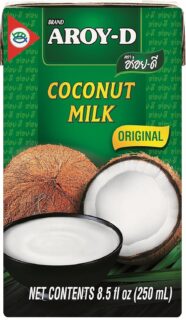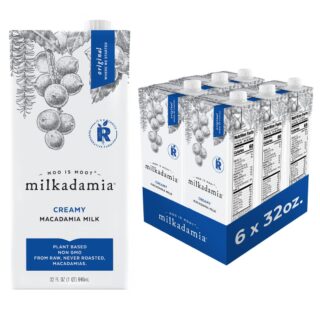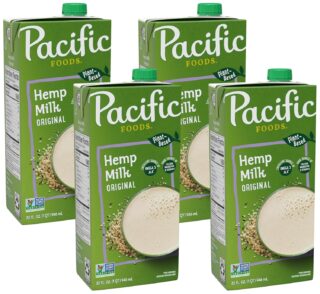Plant-based living is taking over, with many opting to adopt plant-based dietary habits. As a result, there’s been a rise in plant-based foods, that include plant-based meats and plant-based milks. However, there’s also been a rise in concern about the safety of these alternatives, with many suggesting that they’re not as healthy as their counterparts. Taking to Instagram, functional medicine practitioner and biohacker Richard Game referred to plant-based milks as “highly processed and completely inconsistent evolutionarily for humans.”
Richard Game: 4 Reasons to Stop Drinking Plant-Based Milks
1. High in anti-nutrients
Anti-nutrients are plant compounds that can affect the body’s ability to absorb nutrients, and this remains an area of concern for those following a plant-based diet,
“They [plant-based milks] contain a lot of anti-nutrients, like phytates and oxalates, and oxalates in particular can be very problematic when consumed in high doses.” – Richard Game
Oxalates have been found to cause kidney stones, with one 2022 study suggesting that almond and cashew milk may increase kidney stone risk. That said, the same study also found that oat, macadamia, rice, and soy milk were quite favorable with regard to kidney stone risk. Also, coconut milk may be a favorable dairy substitute for patients with chronic kidney disease, based on its low potassium, sodium, and oxalate content.
2. Contains heavy metals
According to Game, heavy metals like arsenic, cadmium, and lead have been found in many plant-based milks, which can cause a lot of toxicity.

Richard Game
Heavy metals are compounds that bind to your cells and affect the healthy functioning of your organs. This can lead to heavy metal poisoning with symptoms ranging from abdominal pain, dehydration, and nausea, to difficulty breathing, kidney and liver damage, as well as anemia and even an increased risk for cancer.
While heavy metal poisoning is rare, increased exposure to heavy metals can increase our risk, especially if we’re consuming plant-based milks in high quantities. A 2023 study, published in the Journal of Food Composition and Analysis measured the concentrations of 25 toxic metals and trace elements in 60 beverages that included mixed fruit juices, plant-based milks, soft drinks, sodas, and tea.
Per the findings, not only did seven of the 25 elements examined (arsenic, cadmium, manganese, nickel, selenium, and strontium) exceed the allowable limits set by the Environmental Protection Agency (EPA), but lead was detected in 93% of the samples.
Speaking on the study’s findings, lead study author Tewodros Godebo, Ph.D. cautioned against people giving infants and young children mixed-fruit juices or plant-based milks at high volumes,
“Arsenic, lead and cadmium are known carcinogens and well established to cause internal organ damage and cognitive harm in children, especially during early brain development.” he said.
3. Significant source of herbicides/pesticides
Speaking more on the dangers of consuming plant-based milks, Game revealed how the herbicide glyphosate is sprayed on many of the crops used in the production of plant-based milks, which can be detrimental to your health.
Glyphosate has been found to be so detrimental to one’s health that German chemical company Bayer A.G. ceased the residential sale of glyphosate-based herbicides in 2023, particularly its popular weedkiller Roundup. The decision is part of Bayer’s strategy in addressing any future litigation risks.
So, what makes glyphosate so dangerous?
First, the International Agency for Research on Cancer (IARC – 2015) has linked Non-Hodgkin Lymphoma (NHL) to glyphosate and classified it as “probably carcinogenic to humans” (Group 2A).
Glyphosate has also been associated with shorter pregnancies and an increased risk for autism.
So, if you are going to consume plant-based milks, ensure that you only consume glyphosate-residue free plant-based milks.
4. Bad for your gut
A healthy gut means a healthier you. Anything that disrupts the state of your gut can be disruptive to your health.
“Emulsifiers, thickeners, and stabilizers, which are used in a lot of plant-based milks to make them more of a milk consistency, may be problematic to the gut and microbiome,” explains Game.
A 2024 animal study found that common dietary emulsifiers promoted metabolic disorders and gut microbiome dysfunction in mice.
Stay clear of xanthan gum and guar gum, as plant-based milks commonly use them as emulsifiers.
Should I Quit Plant-Based Milk?
The reality is that plant-based milks are a great alternative for individuals who cannot, or choose not to, consume dairy. However, what would be the best course of action for their health?
“If for whatever reason, you can’t consume dairy because you’re either lactose intolerant or casein intolerant, or for some other reason, then my next best solution would be using coconut milk or maybe macadamia as those have the lowest concentrations of a lot of these anti-nutrients and potential toxins.” – Richard Game
It should be noted that coconut milk is also typically higher in calories. A such, you need to monitor your intake when consuming it. Regarding macadamia milk, dietitian Jennifer Cole, RDN, offered the following to Livestrong:
“Macadamia nut milk is a good option if you’re trying to manage diabetes,” Cole said. “Because it’s low in carbohydrates and high in fat, it could also be a good option for someone who is following a medically-prescribed ketogenic diet.”
Hemp milk would also be a great milk-alternative for you. Granted, it does contain anti-nutrients. Yet, it also typically contains no pesticides, fewer calories, and more protein and healthy omega-3 and omega-6 unsaturated fats compared to other plant-based milks.
Want to know more?
Speaking of plant-based milks, almond milk may be your go-to. Unfortunately, your intense love and reliance on almond milk may be killing the bee population.
Who is Richard Game?
Richard Game is a Functional Medicine Practitioner, Performance Coach, Biohacker. He is passionate about helping people optimize their mental and physical performance. Combining ancestral wisdom with functional medicine, his goal is to help and empower people to optimize every aspect of their health, performance, and longevity. For more information on his credentials and methods, you can find him here: Richard Game.
References
@evolvedhealth (2024). Instagram. Available at: https://www.instagram.com/evolvedhealth (Accessed: 04 October 2024)
Borin, J. F., Knight, J., Holmes, R. P., Joshi, S., et al. (2022). Plant-Based Milk Alternatives and Risk Factors for Kidney Stones and Chronic Kidney Disease. Journal of Renal Nutrition : The Official Journal of the Council on Renal Nutrition of the National Kidney Foundation, 32(3), 363. https://doi.org/10.1053/j.jrn.2021.03.011
Godebo, T.,R, Stoner, H.M., Pechilis, M., Taylor-Arnold, H., et al. (2023). Toxic metals and essential elements contents in commercially available fruit juices and other non-alcoholic beverages from the United States. Journal of Food Composition and Analysis, 119, pp.105230–105230. doi:https://doi.org/10.1016/j.jfca.2023.105230.
Lesseur, C., Pathak, K. V., Pirrotte, P., Martinez, M. N., et al. (2021). Urinary glyphosate concentration in pregnant women in relation to length of gestation. Environmental Research, 203, 111811. https://doi.org/10.1016/j.envres.2021.111811
Panyod, S., Wu, W., Chang, C., Wada, N., et al. (2024). Common dietary emulsifiers promote metabolic disorders and intestinal microbiota dysbiosis in mice. Communications Biology, 7(1), 1-14. https://doi.org/10.1038/s42003-024-06224-3
von Ehrenstein, O. S., Ling, C., Cui, X., Cockburn, M., et al. (2019). Prenatal and infant exposure to ambient pesticides and autism spectrum disorder in children: population based case-control study. BMJ (Clinical research ed.), 364, l962. https://doi.org/10.1136/bmj.l962






![women [longevity live]](https://longevitylive.com/wp-content/uploads/2020/01/photo-of-women-walking-down-the-street-1116984-100x100.jpg)










